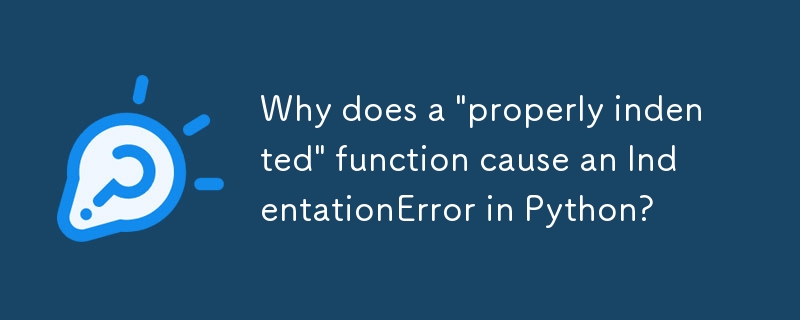Home >Backend Development >Python Tutorial >Why does a \'properly indented\' function cause an IndentationError in Python?
Why does a \'properly indented\' function cause an IndentationError in Python?
- Barbara StreisandOriginal
- 2024-11-03 03:36:02838browse

Why does a "properly indented" function cause an IndentationError in Python?
When working with Python, you may encounter an IndentationError even when your code seems to have correct indentation. This error can arise when using a "try" block without a corresponding "except" or "finally" block.
Suppose you have a code block like this:
<code class="python">def first_function(x):
try:
return do_something_else()
def second_function(x, y, z):
pass</code>
This code may produce an IndentationError like this:
def second_function(x, y, z):
^
IndentationError: unexpected unindent
The error indicates that the indentation of "second_function" is incorrect. However, despite using spaces as indentation and properly aligning the lines, you still encounter the error.
This error occurs because every "try" block requires at least one matching "except" or "finally" block. In the given code, "first_function" contains a "try" block without a matching "except" or "finally" block. This causes Python to expect subsequent code to be within the "try" block, leading to the IndentationError.
To resolve this issue, add a corresponding "except" or "finally" block to "first_function." For example:
<code class="python">def first_function(x):
try:
return do_something_else()
except Exception: # Add an except block to handle exceptions
pass</code>
Alternatively, you can use a "finally" block instead of an "except" block. A "finally" block is always executed, regardless of whether an exception occurs or not.
<code class="python">def first_function(x):
try:
return do_something_else()
finally: # Add a finally block to ensure some code always runs
pass</code>
By adding an "except" or "finally" block, you provide a specific exception handler or ensure that certain code executes regardless of exceptions. This resolves the IndentationError and improves the readability and maintainability of your code.
The above is the detailed content of Why does a \'properly indented\' function cause an IndentationError in Python?. For more information, please follow other related articles on the PHP Chinese website!

